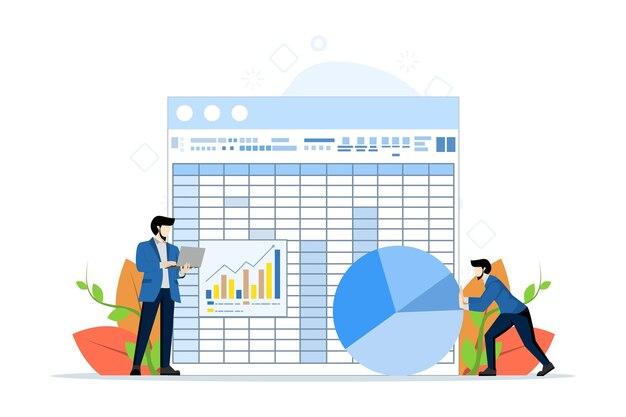Welcome to our blog post on the users of accounting information and their specific information needs. In today’s fast-paced business world, accounting information plays a crucial role in decision-making and financial management. Understanding who uses accounting information, as well as their unique requirements, is key to ensuring effective communication and decision-making.
Accounting information serves a wide range of users, including internal and external stakeholders. Internal users, such as managers and employees, rely on accounting information to make informed decisions about planning, controlling, and evaluating the performance of the organization. On the other hand, external users, like investors, creditors, and government agencies, use accounting information for assessing the financial health and performance of the company.
In this blog post, we will explore in detail the various users of accounting information and delve into their specific information needs. We will also touch upon the importance of studying accounting information systems, the advantages and disadvantages of computer-based systems, and the crucial role accountants play in ensuring effective information management. So let’s dive in and discover the fascinating world of accounting information systems!

Who Uses Accounting Information and What Do They Need?
Accounting information is crucial for various stakeholders who rely on it to make informed decisions regarding financial matters. From business owners to investors, there is a diverse range of users with distinct information needs. Let’s explore who these users are and what specific information they require.
Business Owners: Keeping an Eye on the Bottom Line
As the saying goes, “money makes the world go ’round,” and no one understands this better than business owners. Whether they’re running a small mom-and-pop shop or a multinational corporation, business owners rely on accounting information to monitor the financial health of their organizations.
Through accounting, business owners can track revenue and expenses, analyze profit margins, and evaluate the overall performance of their ventures. They need access to accurate financial statements, such as income statements and balance sheets, to make informed decisions about pricing, investments, and growth strategies.
Investors: Decoding the Numbers to Maximize Returns
Investors, like seasoned detectives, comb through financial data to uncover hidden gems. They rely on accounting information to assess the financial viability and potential returns of various investment opportunities. Whether it’s a stock, bond, or real estate venture, investors need reliable financial statements to guide their decisions.
Financial ratios, such as earnings per share (EPS), return on investment (ROI), and debt-to-equity ratio, provide valuable insights into a company’s performance and profitability. Investors carefully analyze these ratios to compare different investment options and determine which ones offer the best potential for maximizing their returns.
Lenders: Evaluating Creditworthiness and Managing Risk
When individuals or businesses need capital to fund their aspirations, they often turn to lenders. Lenders, whether traditional banks or peer-to-peer lending platforms, utilize accounting information as a crucial tool to assess the creditworthiness and manage the risks associated with lending money.
Lenders examine financial statements, cash flow forecasts, and credit history to evaluate the borrower’s ability to repay the loan. By scrutinizing these details, lenders can determine the interest rate, loan amount, and loan terms that are appropriate for the borrower’s financial situation. Accurate accounting information helps lenders make prudent lending decisions to minimize the risk of defaults.
Government Agencies: Ensuring Compliance and Collecting Taxes
The government may not always be a fan-favorite, but it plays an essential role in overseeing financial matters. Government agencies rely on accounting information to ensure regulatory compliance, collect taxes, and analyze the overall economic health of a nation.
To effectively enforce tax laws, government agencies require detailed financial statements, transaction records, and tax returns from individuals and businesses. These documents help verify income, track expenses, and hold taxpayers accountable for their financial obligations. By leveraging accounting information, government agencies can make better-informed decisions regarding taxation policies and economic planning.
Managers: Navigating the Business Battlefield
Managers, the fearless captains of the business battlefield, rely on accounting information to steer their ships in the right direction. From strategic planning to day-to-day operations, managers need accurate and up-to-date financial data to make informed decisions that drive growth and profitability.
By analyzing financial statements, budget reports, and cost analysis, managers can identify areas of improvement, allocate resources wisely, and develop effective strategies. From determining marketing budgets to evaluating the feasibility of new projects, accounting information empowers managers with the insights they need to navigate rough waters and stay ahead of the competition.
In conclusion, accounting information caters to a wide range of stakeholders with diverse needs. Whether it’s business owners keeping a keen eye on their bottom line, investors decoding financial numbers to maximize returns, lenders evaluating creditworthiness, government agencies ensuring compliance, or managers battling it out in the business world, accounting information plays a vital role in facilitating informed decision-making. So, the next time you come across those financial statements, remember that they hold valuable insights for a multitude of users seeking to make sense of the numbers.

FAQ: Who Are the Users of Accounting Information and What Are Their Specific Information Needs?
In the world of accounting, information is everything. But who are the people who rely on this information, and what do they need to know? We’ve compiled a list of frequently asked questions to shed some light on the users of accounting information and their specific needs.
What are the main users of accounting information
Accounting information has a wide range of users, including:
-
Business Owners and Managers: They use accounting information to make informed decisions about the financial health and performance of the business. They rely on it to assess profitability, manage cash flow, and plan for the future.
-
Investors and Shareholders: Investors use accounting information to evaluate the financial stability and potential return of an investment. Shareholders rely on it to assess the value of their shares and make investment decisions.
-
Creditors: Creditors, such as banks and lenders, use accounting information to evaluate a company’s creditworthiness and determine whether to extend credit or lend money.
-
Government Agencies: Government agencies use accounting information for various purposes, including taxation, regulation, and economic planning. They rely on it to ensure compliance with laws and regulations and to make informed policy decisions.
-
Employees: Employees may use accounting information to evaluate the financial health of their employer and assess job security. It can also be useful in negotiating wages and benefits.
What specific information do these users need
The specific information needs of accounting information users can vary depending on their role and purpose. Here are some examples:
Business Owners and Managers:
-
Financial statements: They need accurate and up-to-date financial statements, including the income statement, balance sheet, and cash flow statement. These statements provide an overview of the company’s financial performance and position.
-
Budgeting and forecasting: To plan for the future, business owners and managers need information on revenue projections, cost estimates, and cash flow forecasts. This helps them make strategic decisions and set performance targets.
-
Cost analysis: Understanding the costs associated with producing goods or delivering services is crucial. Business owners and managers need information on direct costs, indirect costs, and cost drivers to assess profitability and make cost-saving decisions.
Investors and Shareholders:
-
Financial ratios: Investors and shareholders rely on financial ratios, such as return on investment (ROI), earnings per share (EPS), and price-to-earnings ratio (P/E), to assess the profitability and value of their investments. These ratios help them compare performance across different companies and industries.
-
Dividend information: Shareholders look for information on dividends, including dividend yield and payout ratio, to assess the company’s dividend policy and potential income from their investments.
-
Non-financial performance indicators: Investors may also be interested in non-financial performance indicators, such as market share, customer satisfaction scores, and employee turnover rates, to assess the overall health and potential growth of a company.
Creditors:
-
Financial statements and ratios: Creditors use financial statements and ratios to assess a company’s ability to repay debt. They pay particular attention to liquidity ratios, such as the current ratio and quick ratio, to determine if the company has enough assets to cover its short-term obligations.
-
Credit history: Creditors need information on a company’s credit history, including its payment record and any past defaults or bankruptcies. This helps them assess the creditworthiness and risk associated with lending or extending credit.
Government Agencies:
-
Taxation information: Government agencies need accounting information to ensure accurate assessment and collection of taxes. They rely on financial statements, income records, and other documentation to verify income and expenses and calculate tax liability.
-
Regulatory compliance: Government agencies use accounting information to ensure businesses comply with regulations and standards specific to their industry. This includes reporting requirements, such as the filing of audited financial statements.
-
Economic data: Accounting information is used to collect and analyze economic data at a national and regional level. This helps government agencies monitor economic activity, plan for infrastructure development, and assess the impact of policies on the economy.
Employees:
-
Payroll information: Employees rely on accounting information to ensure accurate calculation of wages, salaries, and benefits. They need access to paystubs, tax deductions, and other payroll information to reconcile their income and assess tax liability.
-
Financial stability: Employees may be interested in the financial stability of their employer. They look for information on revenue, profits, and cash flow to assess job security and evaluate the company’s ability to provide raises, bonuses, and other benefits.
-
Retirement planning: Accounting information related to employee retirement plans, such as 401(k) statements and pension fund balances, is crucial for employees planning for their future financial security.
Accounting information serves a wide range of users with diverse needs. Business owners, investors, creditors, government agencies, and employees all rely on accounting information to make informed decisions, assess financial health, and plan for the future. By understanding the specific needs of these users, accountants can ensure that the information they provide is relevant, accurate, and useful to its intended audience.
So, next time you come across accounting information, remember the various users and their needs. It’s not just numbers on a page; it’s the lifeblood of decision-making and financial success.
